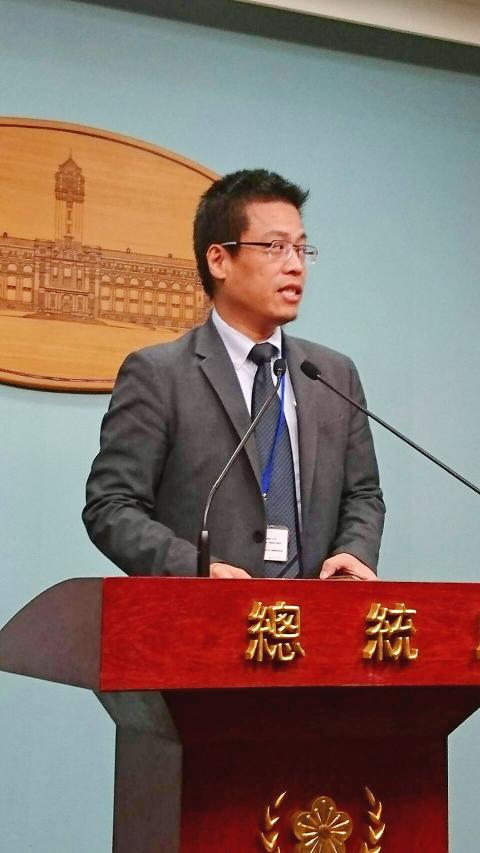China is considering amending its “Anti-Secession” Law to specify more conditions under which it would invade Taiwan, the Yomiuri Shimbun reported on Tuesday.
The story, written by the Japanese daily’s Beijing correspondent, said that Chinese President Xi Jinping’s (習近平) administration is considering revising the act, or creating a national unification act, to prevent US President Donald Trump’s administration from further intervening in Taiwan’s affairs.
Enacted in 2005, the “Anti-Secession” Law mandates that the Chinese government would take non-peaceful methods to defend the nation’s sovereignty and ensure that national territories remain intact should Taiwan secede from China, or if there is no possibility of a peaceful unification.

Photo: Chung Li-hua, Taipei Times
One of the changes it is considering would be an explicit statement by President Tsai Ing-wen’s (蔡英文) administration that Taiwan would not accept the “one China” principle as a condition for invasion, the report said.
Clarifying the conditions for the act is designed to increase the pressure on Taiwan, it said.
Sources claimed that China is also looking into drafting a national unification act.
Xi has been promoting a “grand resurgence of the Chinese nation [zhonghua minzu, 中華民族]” which is inalienable from unification, and China’s National Security Act, passed in 2015, stipulates that “it is the joint obligation of all Chinese citizens, including our compatriots in Hong Kong, Macau and Taiwan, to uphold national sovereignty, seek unification and maintain the integrity of territorial claims,” they said.
One of the sources said that China has “arrived at the stage where it can now use the law to define its path for unification,” the report added.
Commenting on the report, Presidential Office spokesperson Alex Huang (黃重諺) said the government would continue to monitor developments in relation to the report.
The Mainland Affairs Council declined to comment on the report, but said it would continue to update its contingencies based on China’s Taiwan policy and its actions.
Resorting to non-peaceful actions or threats on cross-strait issues is not conducive to future relations, the council said, adding that the stable development of cross-strait relations, and thereby safeguarding the interests of people on both sides of the Strait, is the joint responsibility of the two sides.
China’s Taiwan Affairs Office spokesperson An Fongshan (安峰山) said Beijing would defend its sovereignty and territorial integrity through rule of law.
Additional Reporting by Chung Li-hua

TRAGEDY STRIKES TAIPEI: The suspect died after falling off a building after he threw smoke grenades into Taipei Main Station and went on a killing spree in Zhongshan A 27-year-old suspect allegedly threw smoke grenades in Taipei Main Station and then proceeded to Zhongshan MRT Station in a random killing spree that resulted in the death of the suspect and two other civilians, and seven injured, including one in critical condition, as of press time last night. The suspect, identified as a man surnamed Chang Wen (張文), allegedly began the attack at Taipei Main Station, the Taipei Fire Department said, adding that it received a report at 5:24pm that smoke grenades had been thrown in the station. One man in his 50s was rushed to hospital after a cardiac arrest

SAFETY FIRST: Double the number of police were deployed at the Taipei Marathon, while other cities released plans to bolster public event safety Authorities across Taiwan have stepped up security measures ahead of Christmas and New Year events, following a knife and smoke bomb attack in Taipei on Friday that left four people dead and 11 injured. In a bid to prevent potential copycat incidents, police deployments have been expanded for large gatherings, transport hubs, and other crowded public spaces, according to official statements from police and city authorities. Taipei Mayor Chiang Wan-an (蔣萬安) said the city has “comprehensively raised security readiness” in crowded areas, increased police deployments with armed officers, and intensified patrols during weekends and nighttime hours. For large-scale events, security checkpoints and explosives

A car bomb killed a senior Russian general in southern Moscow yesterday morning, the latest high-profile army figure to be blown up in a blast that came just hours after Russian and Ukrainian delegates held separate talks in Miami on a plan to end the war. Kyiv has not commented on the incident, but Russian investigators said they were probing whether the blast was “linked” to “Ukrainian special forces.” The attack was similar to other assassinations of generals and pro-war figures that have either been claimed, or are widely believed to have been orchestrated, by Ukraine. Russian Lieutenant General Fanil Sarvarov, 56, head

PUBLIC SAFETY: The premier said that security would be tightened in transport hubs, while President Lai commended the public for their bravery The government is to deploy more police, including rapid response units, in crowded public areas to ensure a swift response to any threats, President William Lai (賴清德) said yesterday after a knife attack killed three people and injured 11 in Taipei the previous day. Lai made the remarks following a briefing by the National Police Agency on the progress of the investigation, saying that the attack underscored the importance of cooperation in public security between the central and local governments. The attack unfolded in the early evening on Friday around Taipei Main Station’s M7 exit and later near the Taipei MRT’s Zhongshan